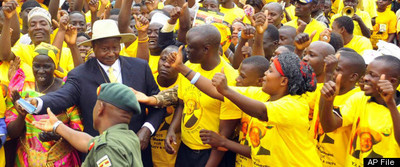The Huffington Post reports on the Uganda elections, “Museveni, a U.S. ally, predicts a “big win,” and most analysts agree he is likely to claim a fourth term. Museveni faces his stiffest competition from former ally and personal physician Kizza Besigye.
Besigye, the candidate for the Inter-Party Cooperation coalition, lost to Museveni in 2001 and 2006 and failed to get the results overturned in court despite proof of widespread intimidation.
Besigye, 54, has already called this vote cycle “fundamentally flawed,” pointing to the incumbent’s control of the electoral commission and the failure to give new voters identity cards as proof that Museveni will rig the vote.
According to the NY Times: “But while Uganda shares many of the same, combustible conditions that have fueled popular uprisings in the Arab world — grinding poverty, masses of jobless, students glued to Facebook and a leader who refuses to step down after more than two decades in power — few here expect widespread upheaval.” “There are two main reasons why we’re not seeing North Africa-style popular revolts in sub-Saharan African,” said Phil Clark, a lecturer in international politics at the School of Oriental and African Studies in London.
First, he argued, many sub-Saharan African countries are more divided ethnically, and such divisions “undermine the possibility of a mass social movement against the national leadership.”
Second, and partly connected, is the loyalty of the army, which is often built from the president’s ethnic group and bolstered by corrupt spoils.
“Museveni and Mugabe can rely on total commitment from the military,” Dr. Clark said. “The fear of violent military crackdowns keeps many Ugandans and Zimbabweans off the streets.”
Many young urban Ugandans, who have been watching their Arab counterparts stage huge protests, seem to agree. “Ugandans have no unity,” said Charles Rollins, a 21-year-old university student, speaking about ethnic divisions. “That is why we are different.”
Click here for a guide on how to pray for the elections in Uganda.
Click here to subscribe to Red Letters. Click here to follow Tom Davis on Twitter.


